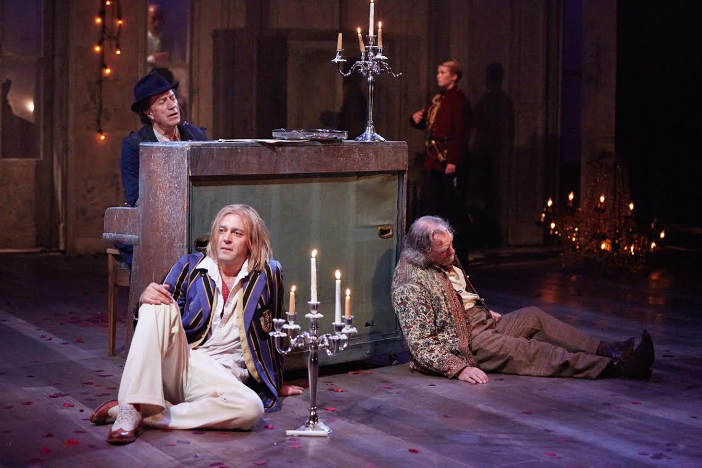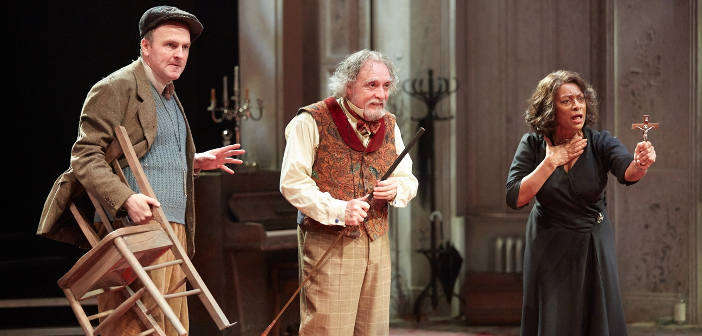‘If music be the food of love, play on.’ Probably Shakespeare’s greatest comedy – and certainly his funniest – Twelfth Night has shown a remarkable versatility in the hands of directors, being presented as everything from a knockabout farce to a sad meditation on unrequited love and sexuality. Now, in Jonathan Munby’s new staging, a co-production between Sheffield Theatres and the estimable English Touring Theatre, a melancholic mood prevails, but thankfully strong casting and a pervading sense of wistfulness and surprise means that, although this doesn’t compete with some stagings for laugh-yourself-silly moments, it is a fine addition to the canon.
Somewhat surprisingly, it is some of the performers in the supporting roles who dominate. I was particularly impressed by Milo Twomey’s Andrew Aguecheek, the ‘thin-faced knave’ who often appears to be presented as little more than the neo-Falstaff Toby Belch’s drinking companion and an easy source of laughs. While there is indeed a scene in which his trousers fall down at a moment of high drama, Twomey (who was an excellent Sebastian Horsley at the Soho Theatre’s one-man Dandy In The Underworld in 2009) brings a poignancy and humanity to the role that makes him much more than a one-dimensional clown. Even if his great line ‘I was adored once, too’ has been given more reflective interpretations, Twomey, somewhat unexpectedly, becomes the heart of this production.
In fact, Munby’s version is somewhat topsy-turvy, in that the comic subplot of Malvolio’s gulling actually feels more affecting and emotionally true than the central story of the cross-dressing Viola, her love for the aristocratic Orsino, and his own infatuation with the ever-distant Olivia. Rose Reynolds plays Viola in traditional wide-eyed and heart-pounding style, which is fine, if somewhat generic; one longs for the great ‘She sat like patience on a monument’ speech to be given more consideration and weight. Rebecca Johnson is appropriately saucy as Olivia – so much so that her mourning for her brother seems almost irrelevant – and the handsome Jake Fairbrother makes for a frequently shirtless Orsino, drawing sighs of rapture from many of the women – and the men – sitting around me.

Hugh Ross’s correct, dignified and cold Malvolio is an interesting reading of the part – although I’ve seen both funnier and nastier ones – whereas Brian Protheroe’s Irish-accented Feste conveys the character’s needling requests for money well, although it’s hard not to be irritated by the umpteenth time that Feste is trying to extort cash. (Has anyone ever tried to work out how much the character accumulates over the course of the play?) Other parts are played with suitable vim, and I enjoyed David Fielder’s shrunken and vituperative Belch, rather as if Antony Worrall Thompson had decided to give up shoplifting and hang around aristocratic houses scheming for his supper instead.
The design, by Colin Richmond, is striking – set in a faded and peeling mansion, there is much interesting use of boxes and windows (the ‘box tree’ has seldom been depicted so literally), and the vaguely 30s setting lends itself to intimations of war, something that has been under-explored in productions of the play. I also enjoyed Grant Olding’s score, particularly his settings of Feste’s songs, and even a second-half company dancing scene remains just this side of bearable.
If you’re expecting this Twelfth Night to change your feelings about the play, then you’ll probably be disappointed. For my money, the best staging in recent years remains the revelatory Sam Mendes one at the Donmar in 2002, with Simon Russell Beale magisterial as Malvolio, but this clear, lucid and nonetheless enjoyable production is more than enough to be getting on with for the time being.
Twelfth Night at Theatre Royal Brighton until Saturday 29th November 2014. For more information and tickets visit the website.




